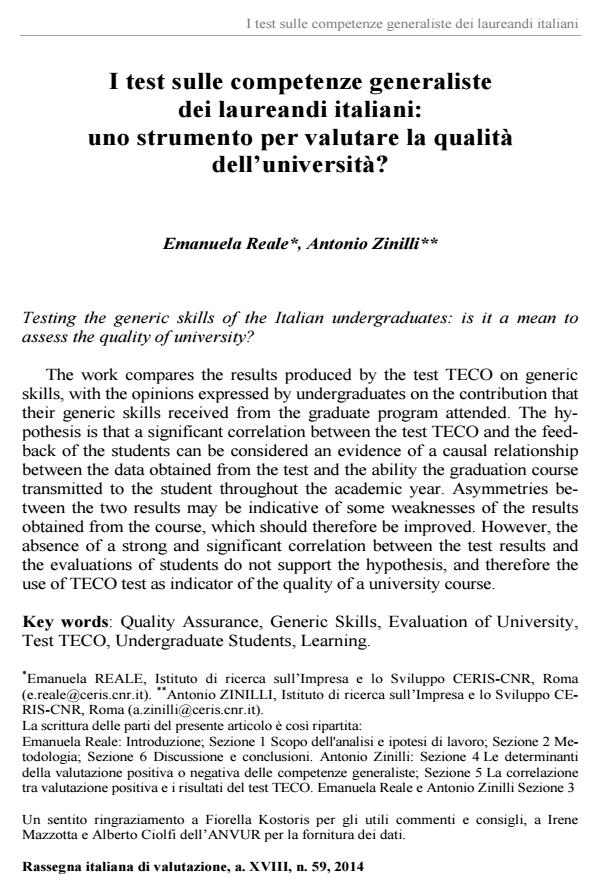Testing the generic skills of the Italian undergraduates: is it a mean to assess the quality of university?
Journal title RIV Rassegna Italiana di Valutazione
Author/s Emanuela Reale, Antonio Zinilli
Publishing Year 2015 Issue 2014/59 Language Italian
Pages 26 P. 78-103 File size 198 KB
DOI 10.3280/RIV2014-059005
DOI is like a bar code for intellectual property: to have more infomation
click here
Below, you can see the article first page
If you want to buy this article in PDF format, you can do it, following the instructions to buy download credits

FrancoAngeli is member of Publishers International Linking Association, Inc (PILA), a not-for-profit association which run the CrossRef service enabling links to and from online scholarly content.
The work compares the results produced by the test TECO on generic skills, with the opinions expressed by undergraduates on the contribution that their generic skills received from the graduate program attended. The hypothesis is that a significant correlation between the test TECO and the feedback of the students can be considered an evidence of a causal relationship between the data obtained from the test and the ability the graduation course transmitted to the student throughout the academic year. Asymmetries between the two results may be indicative of some weaknesses of the results obtained from the course, which should therefore be improved. However, the absence of a strong and significant correlation between the test results and the evaluations of students do not support the hypothesis, and therefore the use of TECO test as indicator of the quality of a university course.
Keywords: Quality Assurance, Generic Skills, Evaluation of University, Test TECO, Undergraduate Students, Learning.
- ANVUR (2014). Le competenze effettive di carattere generalista dei laureandi italiani. Rapporto Finale dell’ANVUR, 11 marzo, disponibile a: www.anvur.org/attachments/article/638/Rapporto%20TECO%20stralciato.pdf, ultimo accesso 23 giugno 2014
- Baird, L. (1988). Diverse and Subtle Arts: Assessing the Generic Outcomes of Higher Education. In C. Adelman (Ed.), Performance and Judgment: Essays on Principles and Practice in the Assessment of College Student Learning, U.S. Government Printing Office, Washington
- Banta, T. (2007). A Warning on Measuring Learning Outcomes. Inside Higher Education, 26, January, Washington, DC, disponibile a: www.insidehighered.com/views/2007/01/26/banta#ixzz27ZMS4500 ultimo accesso 23/06/2014
- Badcock P.B.T., Pattison P.E., Harris K-L (2010). Developing generic skills through university studt: a study of arts, science and engineering in Australia. Higher Education, 60: 441-458
- Barrie, S. C. (2006). Understanding what we mean by the generic attributes of graduates. Higher Education. The International Journal of Higher Education and Educational Planning, 51, 215–241
- Bath, D., Smith, C., Stein, S., & Swann, R. (2004). Beyond mapping and embedding graduate attributes. Bringing together quality assurance and action learning to create a validated and living curriculum. Higher Education Research and Development, 23, 313–328
- Douglass J. A., Thomson G., Zhao C-M. (2012). The learning outcomes race: the value of self-reported gains in large research universities. Higher Education, 64: 317-335
- Ewell, P. (2012). A World of Assessment: OECD’s AHELO Initiative. Change The Magazine of Higher Learning, Vol. 44(5), pp. 33-42
- Leckey, J. F., & McGuigan, M. A. (1997). Right tracks–wrong rails: The development of generic skills in higher education. Research in Higher Education, 38, 365–378
- Kemp, I. J., & Seagraves, L. (1995). Transferable skills—can higher education deliver? Studies in Higher Education, 20, 315–328
- Klein S., Benjamin R., Shavelson R., Bolus R.(2007). The Collegiate Learning Assessment. Facts and Fantasies. Evaluation Review, 31(5(: 415-439
- Kostoris Padoa Schioppa F. (2012), Ragioni, Criteri e Modalità di Realizzazione di un Test sulle Competenze effettive di Carattere Generalista dei Laureandi italiani, ANVUR, 10 agosto, disponibile a: http://www.anvur.org ultimo accesso: 23 giugno 2014 Olds, K. and S. Robertson (2011), On being seduced by The World University Rankings. Inside Higher Education, 5 October, Washington, DC
- OECD (2008). Tertiary Education for the Knowledge Society. OECD Publishing, Paris
- OECD (2012). Assessment of Higher Education Learning Outcomes AHELO Feasibility Study Report. Voll. 1, 2 and 3. OECD Publishing, Paris
- OECD (2013). OECD Skills Outlook 2013: First Results from the Survey of Adult Skills. OECD Publishing, Paris
- OECD (2014). PISA 2012 Results: What Students Know and Can Do. Students Performance in Mathematics, Reading and Science (Vol. I). OECD Publishing, Paris
- Possin K. (2013), A Fatal Flaw in the Collegiate Learning Assessment Test, in Assessment Update. Progress, Trends and Practices in Higher Education, available at: http://www.assessmentupdate.com/article-print-page/a-fatal-flaw-in-the-collegiatelearning-assessment-test.aspx, ultimo accesso 23 giugno 2014
- Rhodes, T. (2012). Getting Serious About Assessing Authentic Student Learning. Commentary on R. Benjamin. The Seven Red Herrings About Standardized Assessments in Higher Education. September, National Institute for Learning Outcomes Assessment
- Adam S. (2004). Using Learning Outcomes. University of Westminster, Final Version 20.06.2004
Emanuela Reale, Antonio Zinilli, I test sulle competenze generaliste dei laureandi italiani: uno strumento per valutare la qualità dell’università? in "RIV Rassegna Italiana di Valutazione" 59/2014, pp 78-103, DOI: 10.3280/RIV2014-059005